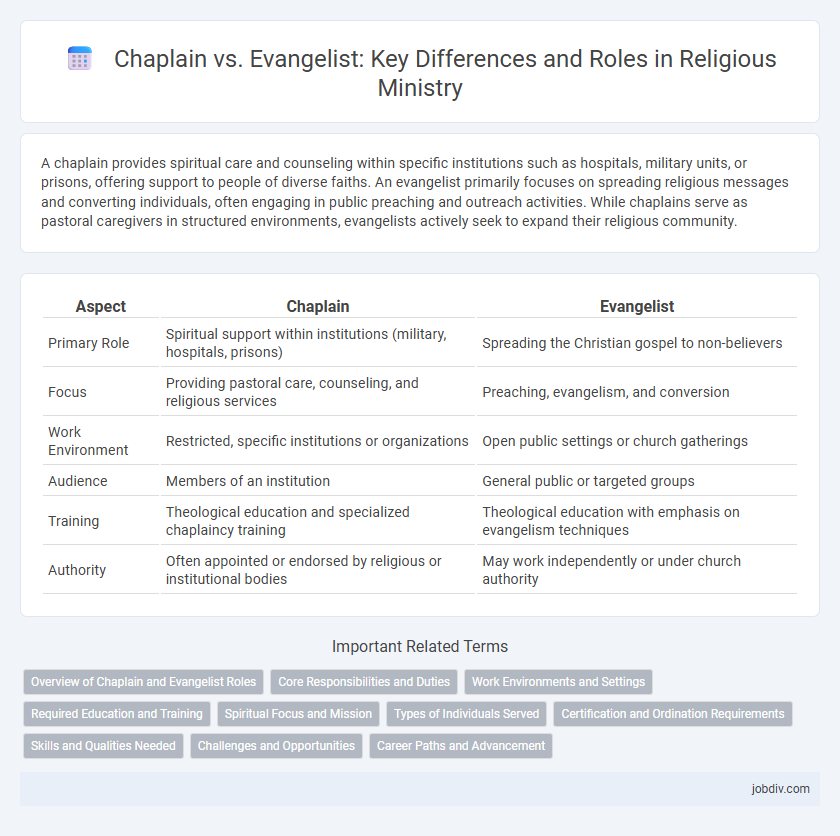A chaplain provides spiritual care and counseling within specific institutions such as hospitals, military units, or prisons, offering support to people of diverse faiths. An evangelist primarily focuses on spreading religious messages and converting individuals, often engaging in public preaching and outreach activities. While chaplains serve as pastoral caregivers in structured environments, evangelists actively seek to expand their religious community.
Table of Comparison
| Aspect | Chaplain | Evangelist |
|---|---|---|
| Primary Role | Spiritual support within institutions (military, hospitals, prisons) | Spreading the Christian gospel to non-believers |
| Focus | Providing pastoral care, counseling, and religious services | Preaching, evangelism, and conversion |
| Work Environment | Restricted, specific institutions or organizations | Open public settings or church gatherings |
| Audience | Members of an institution | General public or targeted groups |
| Training | Theological education and specialized chaplaincy training | Theological education with emphasis on evangelism techniques |
| Authority | Often appointed or endorsed by religious or institutional bodies | May work independently or under church authority |
Overview of Chaplain and Evangelist Roles
Chaplains provide spiritual care and support within institutional settings such as hospitals, military units, and prisons, addressing diverse faith needs through counseling, rituals, and crisis intervention. Evangelists specialize in spreading religious messages and converting individuals, often through preaching, public speaking, and community outreach focused on faith growth and revival. Both roles emphasize spiritual guidance but differ in context, with chaplains serving existing communities and evangelists actively expanding religious belief.
Core Responsibilities and Duties
Chaplains provide spiritual support and counseling within institutional settings such as hospitals, military units, or prisons, addressing diverse religious needs and crisis situations. Evangelists focus on spreading the Christian gospel, preaching, and converting individuals through outreach programs and public evangelism efforts. Both roles involve pastoral care, but chaplains primarily serve confined communities, while evangelists emphasize active mission work and public ministry.
Work Environments and Settings
Chaplains primarily serve in institutional settings such as hospitals, military bases, prisons, and universities, providing spiritual care and counseling tailored to diverse populations. Evangelists typically work in public spaces, churches, and community events, focusing on preaching, outreach, and spreading religious messages to broader audiences. The chaplain's environment emphasizes support within structured organizations, while evangelists operate in more dynamic, outreach-oriented contexts.
Required Education and Training
Chaplains typically require a Master of Divinity (MDiv) degree and specialized clinical pastoral education, often including endorsement from a recognized religious denomination and certification through organizations such as the Association of Professional Chaplains. Evangelists usually need theological education ranging from a bachelor's degree to seminary training, with emphasis on biblical studies, evangelism techniques, and ordination within their faith tradition. Both roles demand continuous spiritual formation and practical ministry experience tailored to their specific religious context.
Spiritual Focus and Mission
Chaplains provide spiritual care and emotional support within institutions such as hospitals, prisons, or the military, focusing on meeting the immediate spiritual needs of diverse individuals in various life circumstances. Evangelists dedicate their mission to spreading the Christian gospel, emphasizing outreach, conversion, and public preaching to expand faith communities. While chaplains prioritize compassionate presence and individual spiritual guidance, evangelists concentrate on proactive evangelism and faith proclamation.
Types of Individuals Served
Chaplains primarily serve individuals within specific institutions such as hospitals, military units, prisons, and universities, offering spiritual support tailored to diverse and often interfaith populations. Evangelists focus on reaching broader public audiences, aiming to spread Christian teachings and convert non-believers through outreach events, sermons, and personal ministry. The distinction lies in the chaplain's role within established communities versus the evangelist's emphasis on active evangelism and church growth.
Certification and Ordination Requirements
Chaplains typically require formal certification through accredited organizations and must undergo specialized training in counseling, ethics, and interfaith dialogue to provide spiritual support in institutional settings. Evangelists often pursue ordination within a specific denomination, emphasizing preaching, evangelism, and community outreach, with requirements varying widely among churches. Both roles demand a commitment to religious doctrine and practical ministry skills, but chaplaincy emphasizes professional accreditation, while evangelism prioritizes denominational endorsement.
Skills and Qualities Needed
Chaplains require strong interpersonal skills, empathy, and the ability to provide spiritual support across diverse faiths, emphasizing confidentiality and crisis counseling. Evangelists need exceptional public speaking abilities, persuasive communication, and passion for outreach to effectively share religious messages and inspire faith. Both roles demand deep theological knowledge, emotional intelligence, and commitment to spiritual leadership.
Challenges and Opportunities
Chaplains often face challenges in providing spiritual support in diverse, secular environments such as hospitals and military settings, requiring adaptability and interfaith sensitivity. Evangelists encounter opportunities to spread religious messages widely through mass media and public events, but they must navigate skepticism and cultural barriers. Both roles demand strong communication skills and resilience to address the spiritual needs of varied audiences effectively.
Career Paths and Advancement
Chaplains often advance through specialized roles in healthcare, military, or institutional settings, gaining certifications and advanced degrees in pastoral care or counseling for career growth. Evangelists typically expand their influence by organizing large-scale outreach events, authoring religious materials, or leading evangelistic ministries, enhancing visibility and leadership opportunities within church networks. Both paths demand strong communication and spiritual guidance skills, but chaplains prioritize formal education and institutional roles, while evangelists focus on public engagement and evangelism impact.
Chaplain vs Evangelist Infographic

 jobdiv.com
jobdiv.com